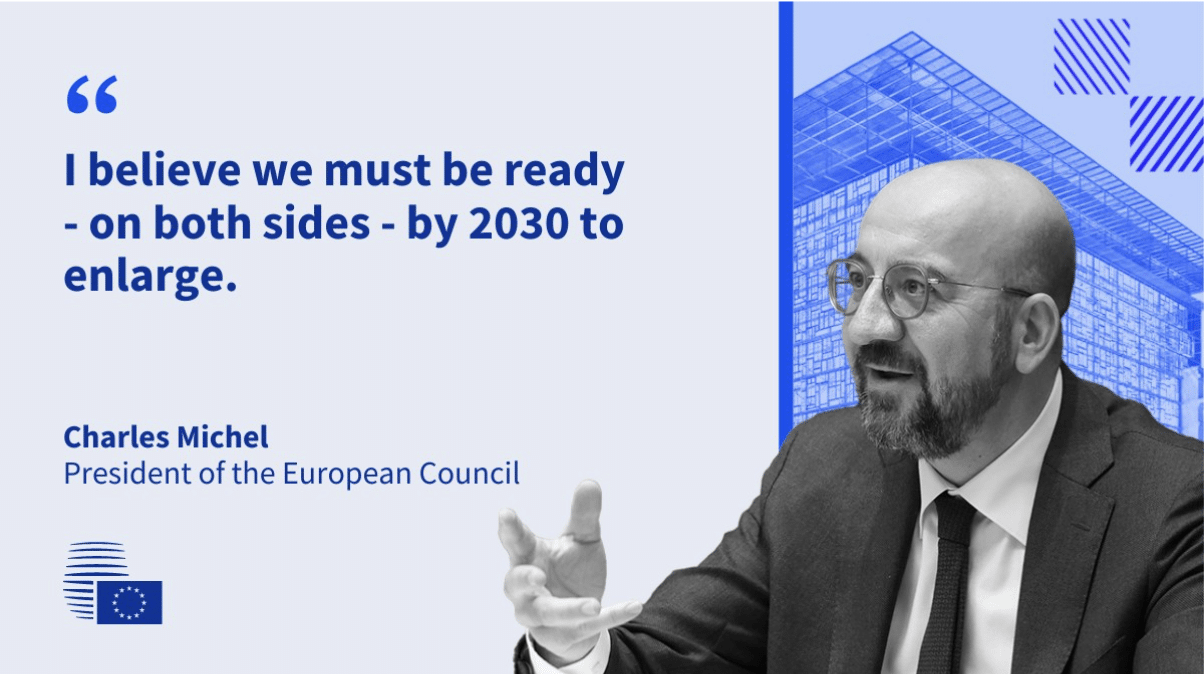Photo: European Council
On the 28th of August, during the 18th edition of the Bled Strategic Forum in Slovenia, Charles Michel, the Head of the European Council, gave a notable speech for an audience that included leaders of Albania, Bosnia and Herzegovina, Moldova, Montenegro and North Macedonia – countries which have all been granted official EU candidate status. In the speech, he said: “I believe we must be ready – on both sides – to enlarge by 2030.” He added that the target is “ambitious, but necessary.” In terms of concrete further action, he announced that “EU leaders will discuss enlargement at our next European Council meetings.” The same day, during the annual gathering of French ambassadors in Paris, President Emmanual Macron advocated for similar goals. He stated that “we’ll need audacity, to accept more integration in some areas and maybe even a multi-speed Europe.”
However, not all relevant actors are as enthusiastic about the remarks of the EU chief. Furthermore, the EU enlargement process faces serious challenges regarding reforms for both the EU and its candidate countries. Additionally, these countries are affected by growing influence from non-EU countries, which might also threaten the enlargement process. This article will discuss the many challenges ahead for the target proposed by Charles Michel.
Reactions to Michel’s statements
The most notable reaction to the speech came from the European Commission. Dana Spinant, its deputy spokesperson, shot down Michel’s remarks, saying that the commission is not “focused on a date”, adding that enlargement is a “merit-based process” and that “candidates should join the European Union when they are ready.” Furthermore, she expressed discontent with the fact that the Head of the European Council had not discussed the statement’s content with Commission President Ursula von der Leyen beforehand.
Another remarkable reaction came from Albania. Its Prime Minister, Edi Rama, commented on the speech saying that the enlargement process would take much longer than seven years and that, apart from moving goalposts, much more action is necessary from the EU. He stated that “there should not only be reforms and criticism that are necessary, but also the most consistent support, and I’m not talking only from the financial point of view, but also the market access of our enterprises.” Similarly, the Serbian Prime Minister called Michel’s statements unrealistic, arguing that the criteria for membership are constantly changing and that there is no end in sight. These reactions signal that Michel’s EU enlargement ambitions are not as widespread as he might have hoped.
Challenging reforms
Before the candidate countries can officially join the EU, which Michel hopes to be soon, an extensive set of criteria needs to be met. This requires some sort of domestic stability, which is clearly lacking in certain candidate countries. For instance, Bosnia and Herzegovina is facing serious issues with separatism, political repression, and anti-constitutionality. Another noteworthy example is the ongoing tensive conflict between Kosovo and Serbia.
Candidate countries are also required to implement reforms that tackle organised crime, ensure an independent judiciary, fight corruption, and align foreign policy with the other EU countries. However, these steps are highly complicated for candidate countries that are struggling with oligarchy, high rates of corruption, infiltrating Russian influence, and disagreements about judicial reforms.
Apart from reforms for its candidate countries, the EU enlargement process is also causing intense discussions about EU reforms. Firstly, budget reforms might be necessary as many candidate countries have a relatively low GDP per capita compared to current EU member states. Secondly, reforms regarding the ‘qualified majority’ voting model might also be required, as more member states would lead to a necessary adaptation to the weighing of votes. Lastly, the requirement of unanimous voting, which selectively occurs, is debated, as more member states would lead to more potential vetoes which could set back the EU decision-making process.
‘Appealing’ alternatives to the EU
The many reforms that are required from both the candidate countries and the EU itself impose serious challenges to Charles Michel’s aspirations. Another threat to the EU enlargement process is imposed by external political forces which present themselves as appealing alternatives to the EU. For instance, Russia has historically had a significant undermining influence in many of the EU candidate countries, which it continues to exercise. This is visible through the many pro-Russia parties and politicians active in these countries. Using anti-EU rhetoric and disinformation, these political forces strongly advocate for economic and political dependency on Eastern neighbours instead of Western ones.
These efforts have also resulted in some political actors in candidate countries calling for joining the BRICS instead of the EU. This follows last week’s BRICS-summit during which the invitation of six new members was announced. For instance, on the 29th of August, the secessionist Bosnian Serb leader Milodrad Dodik, on social media platform X, argued that Bosnia and Herzegovina has better chances of joining BRICS than the EU and should therefore apply for membership of the BRICS group. He said that Republika Srpska would “send a proposal to consider this initiative to the central BiH bodies.” In Serbia, a similar proposal has been submitted to parliament by a junior partner representing the Socialist Movement party, which is part of Serbia’s ruling coalition. The pro-Russian Aleksandar Vulin argued that the BRICS are a “clear alternative” to Serbia’s “so-called” EU accession.
Of the BRICS countries, China, in addition to Russia, is also on track to make EU candidate countries increasingly dependent on its autocratic regime rather than the West. Since 2011, China has yearly invested $1B on average in the Western Balkans. Furthermore, Albania, Bosnia and Herzegovina, Montenegro, North Macedonia, and Serbia – all of which are EU candidate countries – have joined the Chinese Belt and Road Initiative and other partnerships with China. Experts worry that China might ‘dept trap’ the Western Balkans so that Beijing can exercise more influence in the region. According to the US Foreign Affairs Committee, “Serbia is projected to hold an estimate of more than $7.9B in Chinese loans. As of 2018, Montenegro owes almost 40% of its external debt to China, followed by North Macedonia with 20%.” These high levels of Chinese investment make it not come as a surprise that the aforementioned Albanian PM, according to Euractiv, argued that “while the EU has been discussing infrastructure for many years, the tangible investment in the region has come from China, ‘Arabs,’ and the United States.” In other words, the growing and/or remaining influence of autocratic regimes in EU candidate countries directly threaten the EU enlargement process.
In conclusion, if Charles Michel wants to make his ambition seem credible, he needs the EU and its candidate countries to tackle many challenges. However, the EU, being one of the world’s strongest supporters of multilateralism, has historically proven to have its mechanisms for overcoming serious threats, fears and doubts. During an upcoming summit in October in Spain, EU leaders will discuss the European Commission’s enlargement package. This will clarify more about the next steps of the EU enlargement process.
Written by Luna Sent



